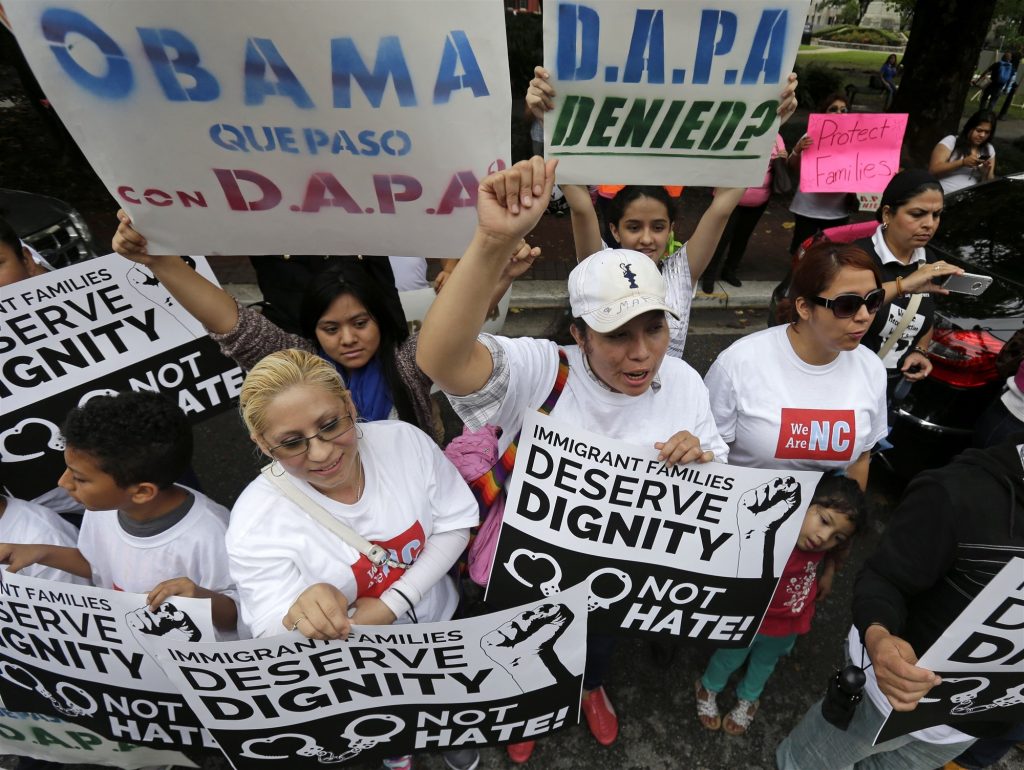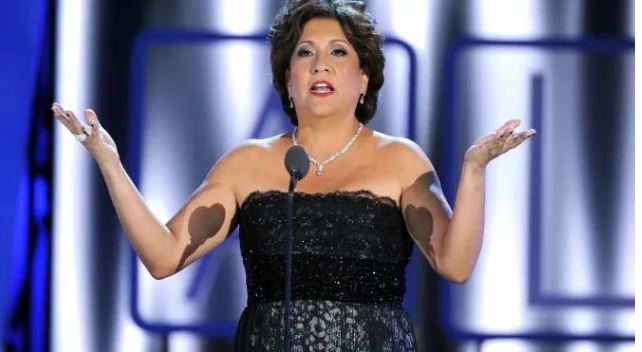Immigration Under Obama – Day 2 of the 2019 US Immigration Wars

Janet Murguía, president of the National Council

“For us, this president has been the deporter in chief,” she said Tuesday during a La Raza awards dinner in Washington. “Any day now, this administration will reach the two million mark for deportations. His response, “I am the champion-in-chief of comprehensive immigration reform,” he declared during a forum at the Newseum in Washington to promote the registration of Latinos in the new medical insurance plans available under the 2010 Affordable Care Act.
Obama reiterated that as long as Congress does not act to reform the immigration system he does not have the authority to stop those expulsions.
“I cannot ignore those laws any more than I can ignore any other laws on the books,” the president said, noting that he had used his executive authority to suspend deportations of many young immigrants who were children when their parents brought them to the United States.
Under President Obama the US Senate Passes a Bill and the US House Does Not
They found 60 votes in the Senate in 2013 for immigration reform. And the House Republican majority refused to take it up for not Only President Obama, but earlier in 2006 for President Bush. Backed by Democrats and 14 Republicans, the Border Security, Economic Opportunity, and Immigration Modernization Act passed the Senate on a 68-32 vote on June 27, 2013.
BILLS-113s744esThe bill directed the Secretary of Homeland Security to submit two reports on border security strategy, including one on where fencing, infrastructure
But House Republicans again opposed the Senate immigration proposal, arguing that border security needed to be addressed first before legalizing the status of millions of immigrants.
Speaking to reporters, Mr. Boehner,
“The idea that we’re going to take up a 1,300-page bill that no one had ever read, which is what the Senate did, is not going to happen in the House,” he said. “And frankly, I’ll make clear we have no intention of ever going to conference on the Senate bill.”
June 2013 in the Senate: Border Security, Economic Opportunity, and Immigration Modernization Act, 68-32
guide_to_s744_corker_hoeven_final_12-02-13The “Border Security, Economic Opportunity, and Immigration Modernization Act,” or S. 744, is a broad-based proposal for reforming the U.S. immigration system written by a bipartisan group of eight Senators known as the “Gang of Eight.” Senators Charles Schumer (D-NY), John McCain (R-AZ), Richard Durbin (D-IL), Lindsey Graham (R-SC), Robert Menendez (D-NJ), Marco Rubio (R-FL), Michael Bennet (D-CO), and Jeff Flake (R-AZ) drafted S. 744 in the spring of 2013. The bill addresses all aspects of the immigration process from border and enforcement issues to legal immigration reforms. It makes changes to the family and employment-based visa categories for immigrants, provides critical due-process protections, increases the availability of nonimmigrant workers to supplement all sectors of the workforce, and provides legal status to 11 million undocumented immigrants within the United States. The Senators intended this legislation to address these issues “…by finally committing the resources needed to secure the border, modernize and streamline our current legal immigration system, while creating a tough but fair legalization program for individuals who are currently here.”
If enacted, S. 744 would require that a series of enforcement measures, or “triggers,” go into effect prior to completing the legalization process. For example, although undocumented immigrants will be allowed to register for the new Registered Provisional Immigrant (RPI) program almost immediately, before those in RPI status can apply to become lawful permanent residents the Department of Homeland Security (DHS) must certify that the Comprehensive Southern Border Security Strategy is deployed and operational, 700 miles of fencing is complete, 38,405 border patrol agents are deployed, and the E-Verify employment verification system is in place, among other requirements. The Development, Relief, and Education for Alien Minors Act (DREAM Act) and Agricultural Job Opportunities, Benefits, and Security Act (AgJobs) are both incorporated into the RPI program, but applicants who qualify under those provisions will be eligible to obtain legal permanent resident status more rapidly.
Other aspects of the bill, such as changes in family and employment-based immigration categories, would go into effect gradually, giving DHS the opportunity to reduce extensive backlogs that have built up due to a lack of available visa numbers. One of the key aspects of the bill, backed by both labor and business, is a new “W” worker program that could expand over time based on workforce needs. Although W visas are for a limited duration, workers in W status may eventually be eligible to apply for lawful permanent residence, marking the first time that such less-skilled nonimmigrant workers would be allowed to transition to permanent resident status without an employer’s sponsorship. S. 744 also expands permanent visas for many foreign graduates from U.S. universities in the sciences and related fields, increases over time the number of temporary high-skilled visas based on demand, and expands opportunities for entrepreneurs and investors to come to the U.S.
S. 744 also addresses long-overdue shortcomings of the immigration removal, detention, and court processes, including authorizing access to counsel for certain vulnerable populations, giving immigration judges more opportunity to make case-by-case determinations on removal decisions, and streamlining the asylum program. It also increases the penalties for certain criminal activities, making it more difficult or impossible to become a legal resident due to drunk-driving convictions, gang activity, domestic violence, passport fraud, and identity theft. Finally, S. 744 encourages immigrant integration through more targeted programs and foundations to help legal immigrants become citizens.
2014-06-11-dhs-complaint-re-cbp-abuse-of-uicsSo the next year a class-action lawsuit
Doe v. Nielsen, No. 4:15-cv-00250-DCB (D. Ariz., filed June 8, 2015)
Immigrant rights groups then filed a class-action lawsuit challenging detention conditions in CBP (Customs and Border Protection) detention facilities. The complaint alleges that Tucson Sector Border Patrol holds men, women, and children in freezing, overcrowded, and filthy cells for days at a time in violation of the U.S. Constitution and CBP’s own policies. Detained individuals are stripped of outer layers of clothing and forced to suffer in brutally cold temperatures; deprived of beds, bedding, and sleep; denied adequate food, water, medicine and medical care, and basic sanitation and hygiene items such as soap, sufficient toilet paper, sanitary napkins, diapers, and showers; and held virtually incommunicado in these conditions for days.
The American Immigration Council, the National Immigration Law Center, the ACLU of Arizona, the Lawyers’ Committee for Civil Rights of the San Francisco Bay Area, and Morrison & Foerster LLP have filed suit on behalf oftwo women detained in the Tucson Border Patrol Station as well as a Tucson man detained twice in that facility. All Plaintiffs consistently recount days of mistreatment and neglect during their time in Border Patrol holding cells. Plaintiffs’ accounts are fully consistent with accounts of the many former detainees who signed declarations describing their confinement in holding cells within the Tucson Sector. Plaintiffs allege that conditions in all of the Tucson Sector Border Patrol facilities violate the Due Process Clause of the Fifth Amendment and the Administrative Procedure Act and seek to compel the Tucson Sector of the Border Patrol to bring its detention facilities in line with Constitutional standards, including limiting the time a person may be detained in holding cells to a few hours, providing adequate food, water, and medical care, beds and bedding, access to showers and hygiene supplies, and maintaining appropriate capacity limits and temperature controls, among other reforms.
Subsequent to filing the suit, Plaintiffs filed a motion for expedited discovery in which they sought the opportunity to inspect 4 of the 8 Border Patrol facilities at issue, as well as copies of CBP video recordings of the holding cells and agency logs from these same 4 facilities dating back to the filing of the complaint. The Court granted expedited discovery. Thereafter, Plaintiffs filed a motion for sanctions over Defendants’ failure to fully comply with the expedited discovery order, which the Court granted in part.
In early 2016, the Court certified a class consisting of all detainees who now or in the future were held overnight in a CBP facility within the Tucson Sector of the Border Patrol. The Court also ruled on Defendants’ Motion to Dismiss, denying it with respect to all of Plaintiffs’ constitutional claims but dismissing Plaintiffs’ APA claims.
On December 4, 2015, Plaintiffs moved for the issuance of a preliminary injunction that would order the Border Patrol to alleviate the harsh conditions of detention as soon as possible. The motion was initially filed under seal. Defendants’ moved to seal much of the evidence supporting Plaintiffs’ preliminary injunction motion, and thus block public exposure to photographs and other revealing evidence. On January 28, 2016, Phoenix Newspapers Inc., the parent corporation to the Arizona Republic newspaper, moved to intervene in the suit for the limited purpose of opposing Defendants’ Motion to Seal. The Court subsequently granted the Arizona Republic’s motion, unsealed numerous documents, and asked for further briefing on the remainder. The Court also amended the class definition such that it now includes all individuals who now are or in the future will be detained by Border Patrol in its Tucson Sector.
On November 14th, 2016, plaintiffs presented evidence at an evidentiary hearing for the preliminary injunction, arguing that the Border Patrol’s facilities continued to violate the rights of detainees. On Friday, November 18, 2016, Judge Bury issued a preliminary injunction, holding among other things that forcing a detainee to sleep on a concrete floor with no bedding was a violation of his or her constitutional rights. Stating that “purgatory should not be worse than hell,” Judge Bury then ordered the Border Patrol to improve the conditions in the Tucson Sector for all class members.
On January 3, 2017, the Court denied Defendants’ Motion for Reconsideration. On March 13, 2017, the Court granted in part a motion for sanctions against Defendants for their failure to preserve video evidence. On March 20, 2017, Defendants submitted evidence to the Court indicating that they had taken remedial steps to ensure preservation of video evidence.
Both parties appealed to the Ninth Circuit. On December 22, 2017, the Ninth Circuit upheld the District Court’s decision in its entirety. Following that decision, the case returns to the District Court for a possible trial on a permanent injunction. As of August 2018, this case remains pending.
- Complaint
- Motion for Class Certification
- Reply in Support of Plaintiffs’ Motion for Class Certification
- Plaintiffs’ Motion for Expedited Discovery
- Reply in Support of Plaintiffs’ Motion for Expedited Discovery
- Order Granting Motion for Expedited Discovery
- Plaintiffs’ Motion for Sanctions
- Reply to Defendants’ Opposition to Sanctions
- Order Granting in Part and Denying in Part Plaintiffs’ Motion for Sanctions
- Plaintiffs’ Opposition to Defendants’ Motion to Dismiss
- Order Granting Plaintiff’s Motion for Class Certification
- Order Granting in Part and Denying in Part Defendants’ Motion to Dismiss
- Motion to Intervene
- Plaintiffs’ Reply in Support of Motion for Preliminary Injunction
- Order on Motion to Seal and Intervention
- Amended Class Definition Order
- Doe Preliminary Injunction Order
- Brief in Support of Plaintiff
- Ninth Circuit Decision – Doe, et al., v. Kelly
Counsel: The American Immigration Council, the National Immigration Law Center, the ACLU of Arizona, the Lawyers’ Committee for Civil Rights of the San Francisco Bay Area, and Morrison & Foerster LLP
Contact: Mary Kenney | American Immigration Council | 202.507.7512 | mkenney@immcouncil.org
Resources:
- FAQ: Border Patrol “Hieleras” – Background and Legal Action
- Way Too Long: Prolonged Detention in Arizona’s Border Patrol Holding Cells, Government Records Show
- Press Release
- Listen to the press teleconference on the lawsuit here.